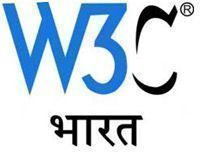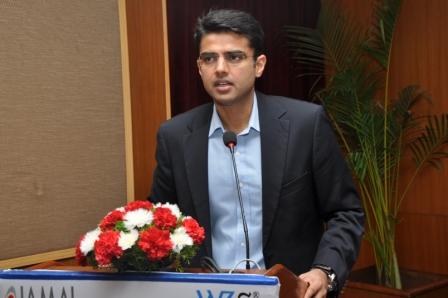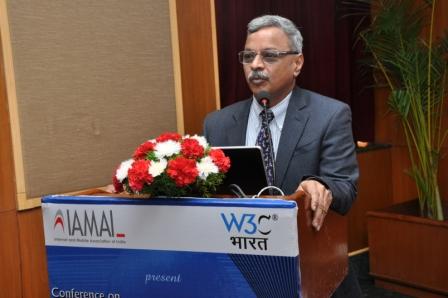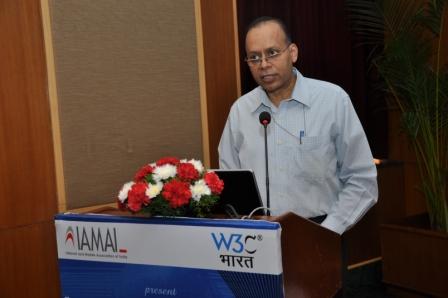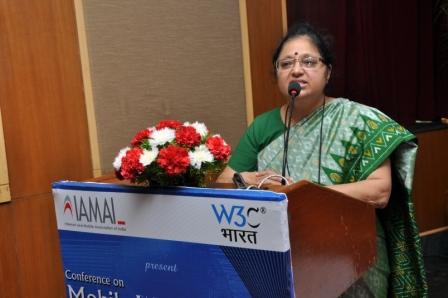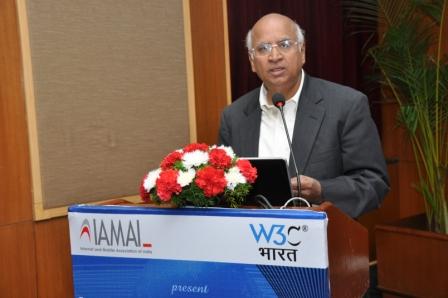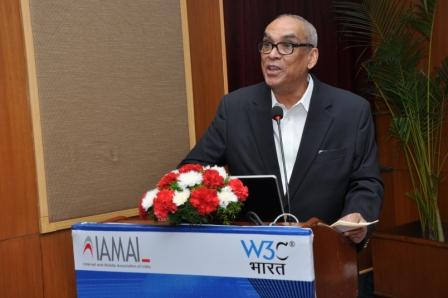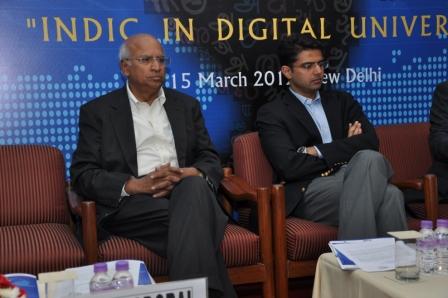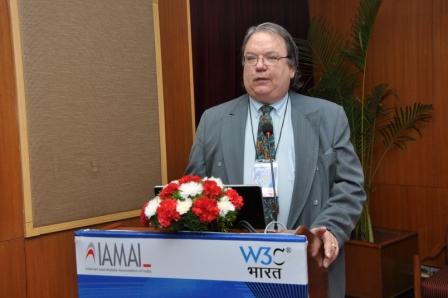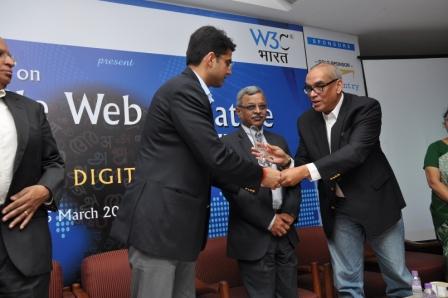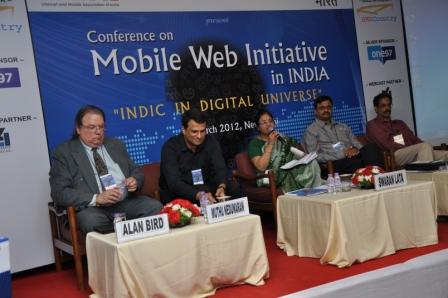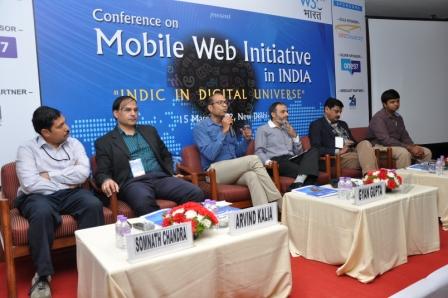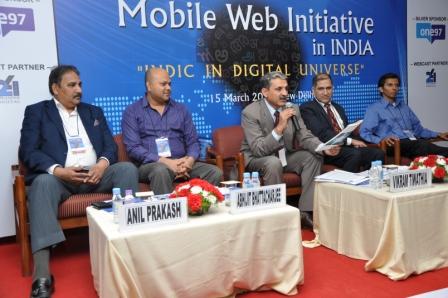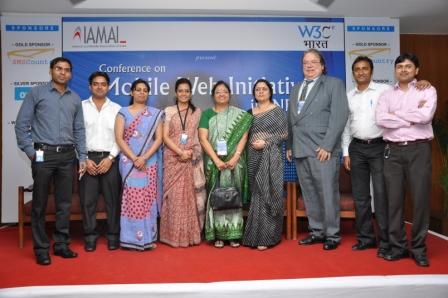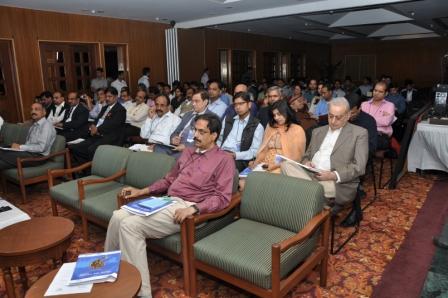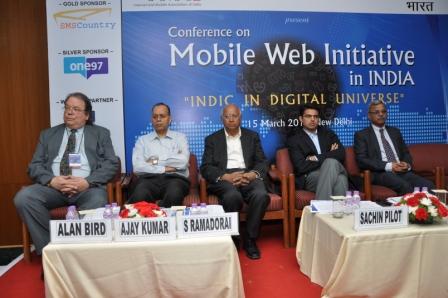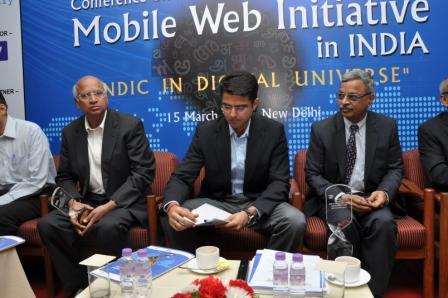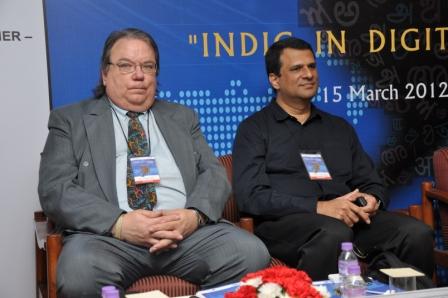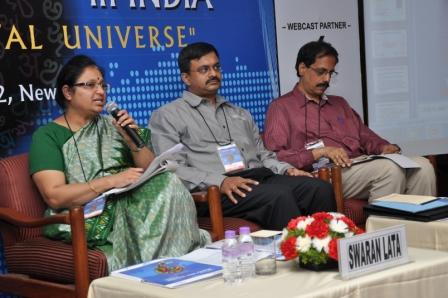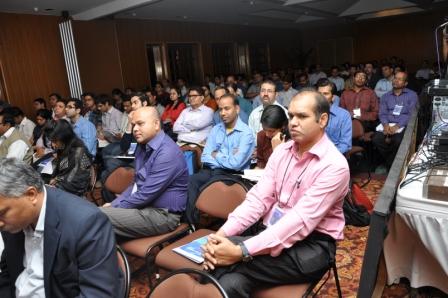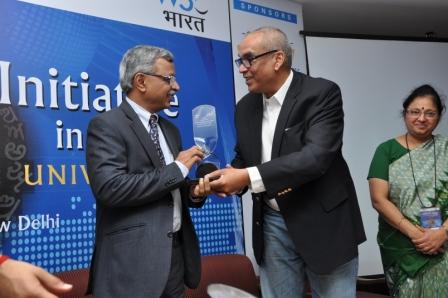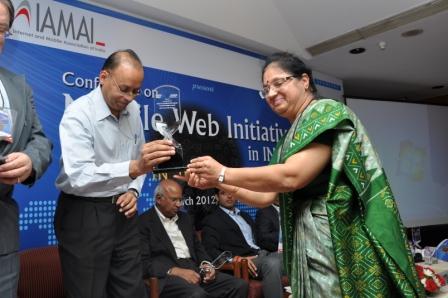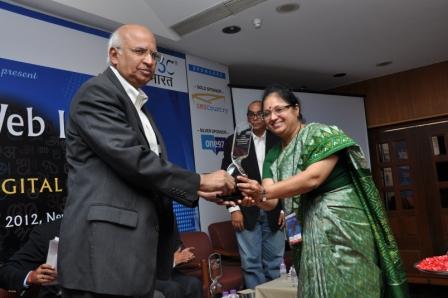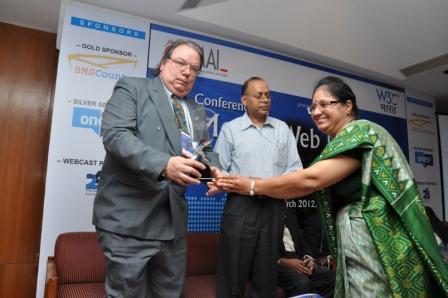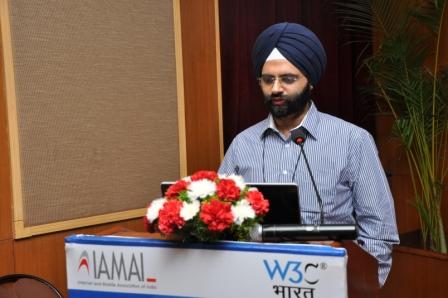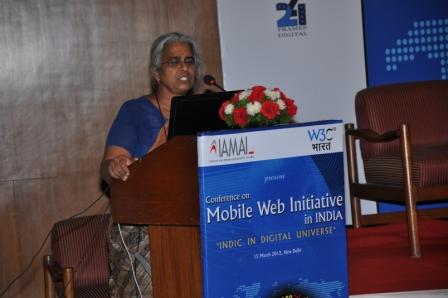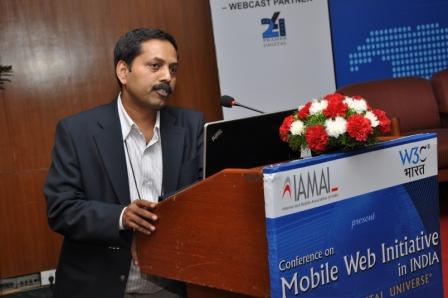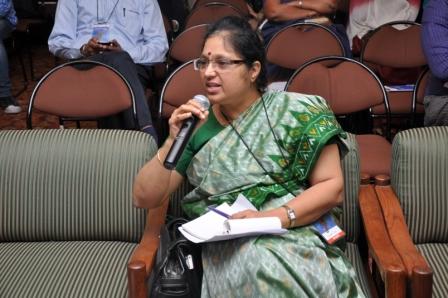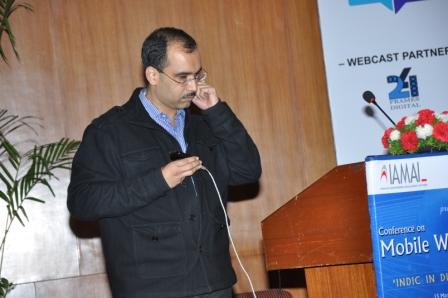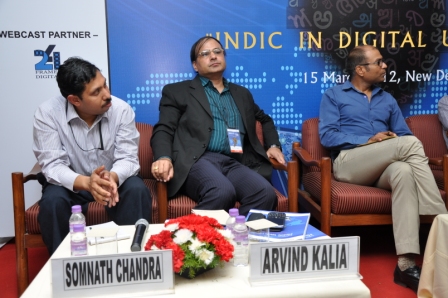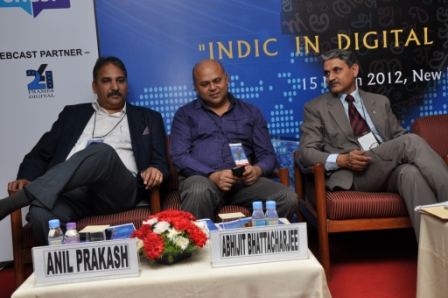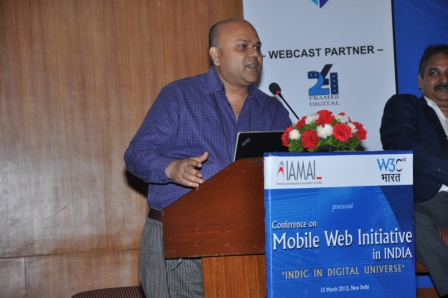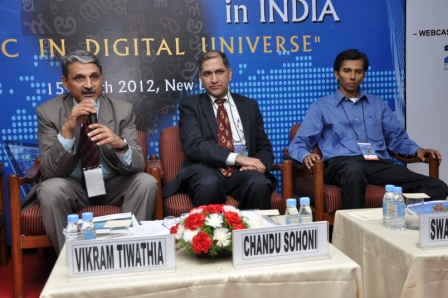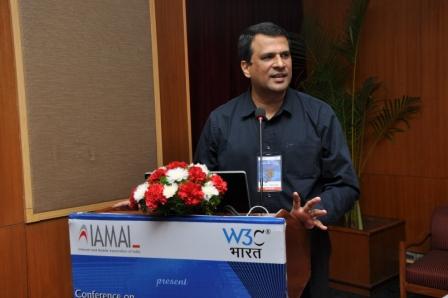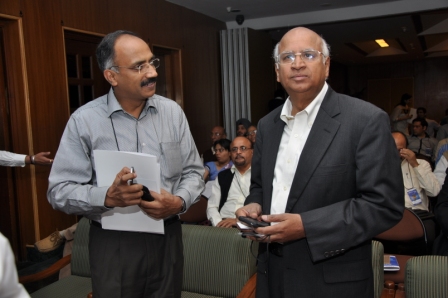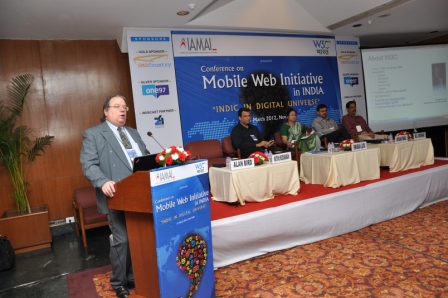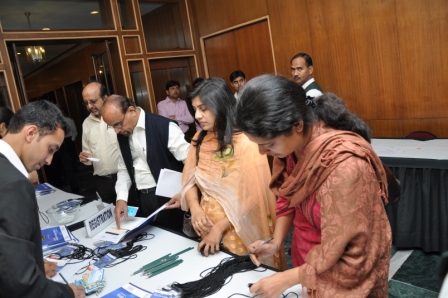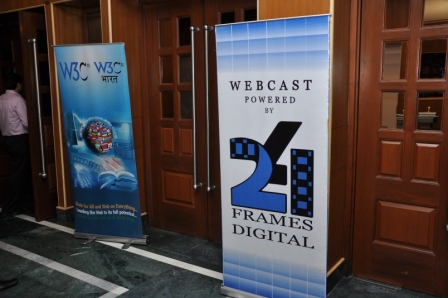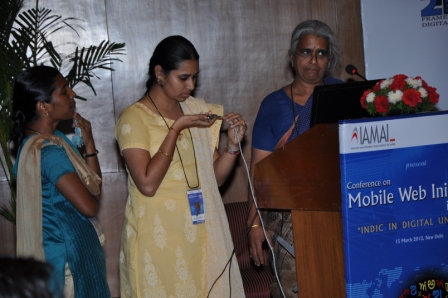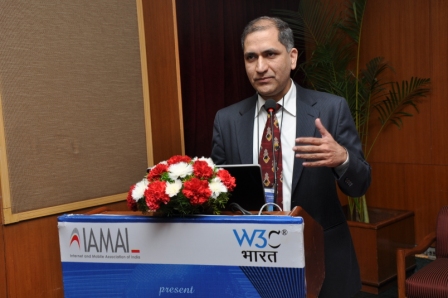Mobile Web integrated with Voice Interface would be the next paradigm shift in computing technology. The increasing processor speed, embedded with the latest signal processing capability for voice, data and multimedia signals makes it the preferred medium of service delivery, increasing focus on client side features.
With the advent of 4G and LTE technologies, the internet and web access through mobile media would receive a tremendous boost. This momentum would further be accelerated if people could use their own language to communicate over the mobile. In India there are 22 constitutionally recognized languages, and a large number of dialects. Therefore, the next giant leap from present user base and beyond has to be primarily driven by Mobile Web and Internet content in the local language which will be used by mostly rural population of India, from where the next surge of mobile penetration is set to grow. This would also usher in governance paradigm shift of citizen centric service delivery through m-governance platform.
Seamless Access of Indian languages over the mobile web would be possible if we address the specific Issues for enabling mobile ecosystems in are addressed quickly. This requires active involvement of all stake hold overs ranging from mobile device manufacturers, service providers, Research community and the users.
W3C Works with all major Mobile Standardization Bodies and works mainly in Application Interface Domain. W3C SMIL (Scalable Multimedia Integration Language) incorporated in 3GPP2, LTE and 4G- LTE Advanced standards. W3C is presently reviewing the Mobile Web Best Practices (MWBP) standard for incorporating the new computing paradigm shift and device capabilities. W3C India should strongly participate in these activity and Indian languages requirements should be submitted to W3C for their incorporation in the next version of the standard. This will enable industry to have a common standard and would enhance the mobile internet usage, particularly in Indian Languages.
W3C India is currently working on Development of Best Practices and Guidelines for Seamless Mobile Access in Indian Languages. W3C India has recently come out with three consultation papers in the areas pertaining to (i) Enabling Mobile Devices in Indian Languages (ii) Service providers perspective and (iii) Mobile VAS Content development.
The Conference began with inaugral session on March 15 2012.The conference was inaugrated by Shri Sachin Pilot, Minister of State, Communications and Information Technology.The main focus of that session was importance of local language in internet and mobile ,moving away from exclusive to inclusive web with Indic and opportunities in Local languages.
The dignitaries present on dias were:- Shri Sachin Pilot, Minister of State, Communications and Information Technology
- Shri J. Satyanarayan,Secretary IT , Ministry of Communication and IT
- Dr. Ajay Kumar, Joint Secretary, Department of Electronics and Information Technology
- Dr. S. Ramadorai, Advisor to the Hon'ble Prime Minister of India, National Skill Development Council
- Ajit Balakrishnan, Chairman Emeritus, IAMAI
- Alan Bird, , Global Business Development Leader, W3C
- Swaran Lata, Country Manager, W3C india
Shri Sachin Pilot, Minister of State, Communications and Information Technology said that India is the 3rd largest telecom user after China and USA and future of computing technology belongs to handheld devices. It is the volume of users and not the technology that will decide the standards in the times to come, he added. Referring to infrastructure that has been created in India, the minister said that huge opportunities exist in the field of content creation.
Shri J. Satyanarayan,Secretary IT , Ministry of Communication and IT presented some of the initiatives of Department of Electronics and Information Technology.He said that some of the initiatives are m-governance under National e-Governance Plan and, Technology development for Indian Languages, Internet Security and Internet Governance
Dr. S. Ramadorai said that Mobile Web integrated with Voice Interface would be the next paradigm shift in computing technology. The increasing processor speed, embedded with the latest signal processing capability for voice , data and multimedia signals makes it the preferred medium of service delivery. Increasing focus on client side features.
Ms. Swaran Lata Country manager summing up the session.She said that the seamless access of Indian languages over the mobile web would be possible if the specific issues for enabling mobile ecosystems were addressed. This requires active involvement of all stake holders ranging from mobile device manufacturers, service providers, Research community and the users.
The main objectives of this session were challenges for enabling Mobile Web in Indian languages,technology for enabling Indian languages on Mobile platform and lack of multi standard interoperability.
The dignitaries present on dias were:- Swaran Lata, Country Manager, W3C india
- Alan Bird, , Global Business Development Leader, W3C
- Venkatarangan Thirumalai, Chairman, Vishwak Solutions
- Muthu Nedumaran, Murasu Systems Sdn Bhd, Malaysia
- M S Sridhar ,Managing Director,SMART Solutions
Ms Swaran lata became the Moderator of the Session.She welcomed all the dignitaries present on the dias.
Alan Bird, , Global Business Development Leader, W3C.He talked the working of W3C in mobile area.He talked about the W3C online training for web developers of mobile Web .He presented important components for devices such as communications,full device capabilities,performance & optimization,styling and testing etc.
Muthu Nedumaran, Murasu Systems Sdn Bhd, Malaysia talked about his Indian and Indo-Chinese (Lao, Khmer & Myanmar) fonts to some of the world's leading mobile device manufacturers. Notably, his Indic fonts are now part of iOS and Mac OS X and a Telugu font is now part of Windows 7.He said that the major future steps are localized OS environments,localization of applications and streamline input methods.
Venkatarangan Thirumalai, Chairman, Vishwak Solutions gave his inputs on technology across platforms.He shareded his experience of running MSN India & BhashaIndia.com (Indian Language Developer site).
M S Sridhar ,Managing Director,SMART Solutions said that one of the important aspects is to give the awareness about the local languages applications in mobile devices.He talke dabout the various issues related to text oriented display on mobile devices.
The main objectives of this session were Lack of Local Language support on commonly visited websites ,lack of Discoverability of existing websites and guidelines for enabling Indic content on mobile devices.
The dignitaries present on dias were :- Dr. Somnath Chandra, Deputy Country Manager, W3C India
- Gyan Gupta, CEO, Danik Bhaskar
- Rajesh Kalra, Times of India Group
- Manish Jaiswal Product Manager,J9 Venture.
- Arvind kalia, National Marketing Head, E-Patrika(Rajasthan Patrika)
- Santosh George Jacob, Content Coordinator Malayala Manorama
Gyan Gupta, CEO, Danik Bhaskar became the moderator of the session.
Dr. Somnath Chandra, Deputy Country Manager, W3C India and Dinesh Chobey,LNMIIT presented the various issues and challenges for enabling Indic content on mobile devices.He talked about the proposed Default Delievery Context for Indian languages.He said that the important components in DDC that needs to be focused are : Page load,image format,scripting language etc. Slides
Rajesh Kalra, Times of India Group sherd his experience in managing dynamic content for websites such as Yahoo India, MSN India and Mantra Online. He disscussed various issues related to fonts on mobile devices.
Manish Jaiswal Product Manager,J9 Venture talked about the mobile versions of Jagaran.He talked about the planning to provide content in different Indian languages in mobile devices.
Arvind kalia, National Marketing Head shared his experience in e-patrika.He talkes about the rajasthan online e-patrika.
The main objectives of this session were Standardization in Text transmission in Indian Language,Current barriers, challenges and limitations for rendering vernacular content ,Best practices of delivery in Mobile device in Indian languages
The dignitaries present on dias were:- Vikram Tiwathia, Associate Director General-COAI
- Chandu Sohoni , Founder Director,Eterno Infotech
- Anil Prakash, Secretary General, IPTV
- Abhijit Bhattacharjee, CEO, Luna Egronomics
- Swapnil Belhe, C-DAC Pune
Vikram Tiwathia, Associate Director General-COAI became the moderator of the session.
Chandu Sohoni , Founder Director,Eterno Infotech is Founder Director at Eterno Infotech. Eterno has done pioneering work in enabling Indian Languages on mobile phones starting from very low cost handsets to high resolution tablets. Eterno was the first company to develop IndiSMS, an application for sending SMS in 9 Indian languages. Slides
Swapnil Belhe has been associated with C-DAC in developing Indian Language solutions including display, inputting and storage for mobiles, set-top-boxes, tablets, display systems and other embedded devices. Swapnil has developed various multi-modal interfaces for mobiles & tablets including Indian language handwritten-recognition, Text-to-Speech etc. He has been involved in development of predictive inputting. Slides
Abhijit Bhattacharjee is the CEO of the Luna Ergonomics which is a start up based in a technology incubator in Noida.He talked about the Panini Keypad and CleverTexting, these new technologies in 22 major languages of the world have found users and wide ranging recognitions and is being considered a breakthrough.
Anil Prakash, Secretary General, IPTV is been a specialist in government relations, regulatory and policy framework.He is an active member of regional and international telecom forums and trade bodies.
The dignitaries present demos were:
- Hema Murthy, IIT Chennai
- Sriranjani Ramakrishnan, IIT Chennai
- Biswajit Saha, C-DAC Kolkata
- Rajesh Hegde, IIT Kanpur
- Parteek Singh,Nuance
Hema Murthy, IIT Chennai presented demo on Text to Speech (Android Platform for Hindi)
Sriranjani Ramakrishnan, IIT Chennai presented demo on Agricultural prices info through Mobile (Speech recognition)
Biswajit Saha, C-DAC Kolkata presented demo on Machine Translation Services through Mobile (English to Hindi and Bengali)Slides
Rajesh Hegde, IIT Kanpur presented demo on Personalized multimodal delivery of Agro-Community Deployment limitations of Cell phones in Indian languagesSlides
Parteek Singh presented demo on speech solutions provided by Nuance.Slides

